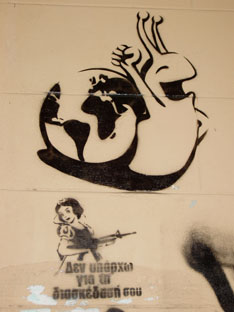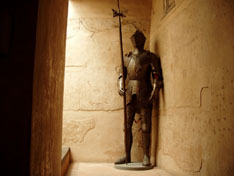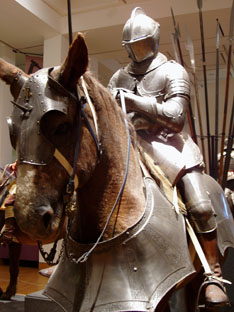Dirty Words in Fantastic Fiction: A Writer Blogs About Process

All writers, whatever their stripe, accomplish the bulk of their labor through the incisive, judicious choice of words. Authors prone to world-building fantasy find themselves shackled in ways that most writers are not, limited to a surprising degree in their available terminology. Consider, if you will, the following wonderful words: renaissance, Stilton cheese, bonobo, perestroika, taco, Hollywood, dim sum, tribologist, Ecuadoran, and haiku.
The common element? You guessed it. Not one of the words in that list is likely to have a place in the literature we lovingly call fantasy fiction.
For those new to my blogging, a quick point of order: I have a trilogy of stories set to appear in Black Gate’s pages in the near future. A novel has grown from the stories, and these blogs are intended to track the progress of that work.
At present, I have typed “The End” onto The Portal, the novel in question, and I am now engaged in the arduous but exciting task of going through the entire manuscript in hard copy, red pen in hand. (As my one-time mentor Chris Kazan said, “If you think it might be wrong, it is.” Dictums like that make for gallons of red ink.) Of particular importance to this blog entry, The Portal is set in a world of my own devising, and it’s that limitation––or opportunity, depending––that tracks me back to the list of “bad” words above.

Puzzler the First: Early on in The Portal, I introduced a country known only as the State, and in describing its populace, I wanted to use the term “citizens.” But could I reasonably and legitimately do so? The Romans coined the term “citizen” (cīvis); was its meaning therefore so specific that I needed to avoid it? An ounce of web surfing revealed that English has been using the word for centuries, beginning with Middle English, and that “citizen” has become somewhat more generic down the years. In light of this, I elected to allow myself the luxury of its use.
“Romans,” however, clearly has no place in any adventure fiction set in a made-up world, be it Middle Earth, Ringworld, or the Purple Isles. Nor would I be able to use “Romanesque,” since the people in my pages would have no referent for such a term. To whit, the only language acceptable in a novel that participates in world-building is that which can be derived, organically and without undue semiotic nail-biting, from the endemic cultures of that newly constructed world.
The ramifications of that simple rule are legion––and I’m not referring to the legions Roman.
Just think of all the things I can’t mention in The Portal: the World Bank, HDTV, President William McKinley, gulags, Thai elephant art, Obamacare, Colt 45 Malt Liquor. Not one of my characters can suddenly erupt into Roy Orbison’s “Crying” (although several clearly want to).

What other strictures do original worlds imply? If I allow for a forest––and I do––must I name each tree afresh? If so, how much time must I take in explaining and describing each of these new tree species in terms that an ideal reader will understand? At what point will the patience of my reader run dry?
My solution has been straightforward: The Portal allows for maples, willows and walnuts, etc., but I then add a few of my own, as needed, including the rootstock tree, typically hollow, together with groves of giants that would make a sequoia feel small, the Trees of the Wind.
Meanwhile, what do my world’s made-up farmers harvest, not once but four times a year? Harrow beans, of course––which so far as I know, do not exist, in English or any other language. But can my farm-folk harvest corn? It’s a definitive New World crop, a veritable indicator species. Most fantastic fiction lodges itself firmly in Old World trappings, no matter what place names get used, so just where am I locating my tale-telling if I bring in maize?

Patrick Rothfuss, in The Name of the Wind, mixes the familiar and mythical to good, easy-on-the-eye effect. He makes ready use of exotic made-up trees (roah and denner), but keeps the majority of his forests stocked with oak, while his roadsides are bordered by everyday sumac (of some sort, at least; the genus Rhus goes on and on and on…). As for corn, Rothfuss includes it without missing a beat, and I suspect not one of his loyal readers finds fault with the choice. Perhaps they have no reason to; after all, the quality of the tale-telling, not the cropland, is the main event.
And yet…
One thing for certain: To introduce a new species of flora just for the pleasure of its nomenclature is a dalliance no adventure novel can stand much of. Every time I add a new creation, I must weigh that keen, sparkling detail against its effect on the work as a whole. Is it more of a distraction than an addition? Does it serve the novel’s theme as well as its story and plot? If it is nothing but décor, does it deserve to be excised immediately? On that last score, I know what Chris Kazan would say.
Another troublesome term: Humans. Human beings. What do I get to call a collection of people in a made-up world? The Latin Homo sapiens is obviously right out, but even “human” is fraught with peril. It comes with an extraordinary number of associations, among them human rights, human frailties, and the ongoing debates between creationists and Darwin. The default, then, becomes “people.” Or perhaps, depending on the situation, “rabble,” “the mob,” “the unwashed masses” or “those guys over there.” Or even, dare I say it, “citizens.”

English is a notoriously inclusive language. It absorbs words and concepts from other cultures like a whale sucking down krill. For my purposes, this adhesive quality can be a double-edged sword. English provides me with fabulous variety––an embarrassment of riches––but a fair number of those words remain strongly associated with their native language base, and I would like to suggest that these, within the realm of the fantastic, are off limits.
Examples include “cul-de-sac,” which I have had to discard more than once in writing The Portal, and “petite,” a term that smacks of French, Amelie, and clothing. On the culinary side, even though my characters eventually find their way to a swampy southern city, they can’t go out for shrimp etouffee and gumbo. Such dishes would literally be invasions from another (verboten) world. Shrimp by itself might, however, be allowable.
So, out with French. Out with Russian (nyet, nyet, Nannette). Out with Italian, too. Otherworldly heroes and heroines don’t take their leave by saying “Ciao.”
Of course, virtually anything with an Anglo-Saxon flavor is acceptable, but to hew too closely to those thick, urgent phonemes is to limit oneself to sex-talk and cursing––and while those, too, have their place, a certain moderation would be in order. (When characters do curse, they might well be better off with invented idioms like “By my beard!”––although if I ever read that trite and tired example again, I shall probably throw the Anglo-Saxing book across the Anglo-Saxing room.)
A quick word on tone and diction level. Because a good many adventure fictions come loaded up with a certain amount of sturm and drang, they would not survive long if they were to suddenly employ words like “cute” and “yummy.” Or imagine this alternate-universe Michael Moorcock: “Elric woke at first light, feeling delightfully peppy.”

Ultimately, all these decisions have the ring of the subjective, and final arbitration lies in a kind of perpetually adjudicated joint custody, with the author and the reader as the two plaintiffs. As Howard Andrew Jones wisely said, every work of fantasy literature is an act of translation, otherwise it couldn’t be written in the first place. Nobody in the mystical realms of Nehwon or Three Firs speaks English, after all. But, we have to write the story somehow, and English, in an English-speaking world, is readily at hand. What follows then is a basic matter of word choice (what Twain called the difference between the lightning and the lightning bug). Fantasy writers of the world-building kind must rely on both good common sense and on the critical euphony of a finely tuned ear. They must deploy words that are as accurate and vital as “humanly” possible, words that never once distract or lurch the reader out and away from the hermetic creation the author intends.
Simple, right?
Right.
Now. Your turn, gentle reader. What words and phrases have you encountered in your reading that threw you clear out of the book? Or, for those of you who also write, what terms did you (sadly, reluctantly, even tearfully) jettison from your arsenal?
Man, you know what gets me even worse than idioms? Naming conventions. I know it’s pretty easy in a fantasy world to just have names be a collection of weird syllables, but I can’t stand it for two reasons: the first is that names AREN’T a collection of weird syllables (unless you’re a male Hobbit, obviously). Names are words that have meaning in languages. The second is that I’ve discovered in my advancing age that I just don’t have ability to remember a bunch of nonsense names anymore. I hit my quota somewhere in the middle of the Wheel of Time series, I think, and I just can’t do it.
English is the worst for names; half of them belong to completely different cultures. You can’t have a fantasy world that uses a kind of Anglo-Saxony language as it’s main language, but doesn’t have Judaism or Christianity, and still use names like Christopher or Judah. Or Ben, Elijah, Joshua, John, James, Jacob, David, Michael, Sarah, Rebecca, Rachael, Peter, Paul, Saul, Simon, Samuel–or even the Romanized names…Patrick, Julian, so forth and so on…ugh.
Combined with the fact that Anglo-Saxon names all sound kind of silly (Egbert, Ethelred, what really?)…well, it’s just a challenge is all.
One way many authors (myself included) have dealt with the problem of relating a world that the audience hasn’t experienced themselves is to make your main character not OF that world but, presumably, of Earth. Failing that, they can still be of something like Earth, or a time in the future of Earth (or the past).
I disagree with the suggestion that only Anglo-Saxon elements are acceptable accoutrements of fantasy; that’s highly limiting for the genre and while it would be appropriate for some books, it would mean the absolute death of others. Additionally, I don’t generally see a whole lot of fantasy novels that take Southeast Asian names and culture into consideration for their base; or any kind of African culture; or South American, or even East European. I think that the limitations of our native tongue shouldn’t be an excuse to keep us from trying new things, different things, and from researching and using information that is not as culturally readily available as, say, the image of a knight in a suit of armor.
I like writing from first person, but when writing short stories usually do third person present tense, which I find pushes me (and hopefully the reader!) into a closeness with the events of the story that allows for a fully detailed, world-specific description without feeling like I’m expounding for ages about the new world. When writing from first person, the most exciting challenge for me is to either have the character casually omit details that a real person in that world would absolutely omit– that the readers might want to know and itch to find out through learning more about the character and their story. Again, if my first-person (unreliable) protagonist/narrator is a foreigner to my fantasy setting, it lets me have the new flora, fauna, and societies described from the perspective of a stranded astronaut from Brazil, or a curious Finnish teen who just stumbled across magic while cleaning out the attic.
There are lots of ways to tackle this problem; I think omitting setting-specific language is one very important detail to remember in world-building, but the danger of hitting a train of exposition has to be the counterbalance so I don’t leave myself with a world so alien it’s impossible to describe. (Or, if it IS that alien, to throw myself into making it as weird and vibrant as possible while still maintaining enough coherence that I don’t forcibly eject my readers forever!)
Well, I’m not saying that Anglo-Saxon has to be the one that you pick, just that if you *do* pick it, it excludes a lot of the names that we’re used to. Well, a lot of the names I’m used to, I guess.
And the problems is that even if you posit your fantasy world as having a rough Anglo-Saxon (or whatever) equivalent, in order to include all the names you want, you start having to have to expand it to include more and more rough equivalents.
And then! I mean, language and culture are shaped by history; English isn’t just the way it is by accident. It’s a product of some massive historical forces. So the more like English your language is, the more like England its history must be.
Or, well, obviously not, since it’s all made up.
The question of Southeast Asian names is an interesting one. I read a book recently that adopted a Southeast Asian naming convention for some of the characters, and I have to admit that because I don’t speak any Southeast Asian languages the names were as meaningless to me as they would be if they were purely made up (albeit with an obvious sort of East Asian flavor). It’s as though, without any personal referent, there was nothing for the name to catch on.
Oh, absolutely. The real trouble with worldbuilding is that the sheer scale of the task is pretty monstrous and it’s dangerously easy to get lost along the way.
Some particularly wonderful authors have suggested that it is a good idea to do the worldbuilding concurrently with the story-writing, and worry about the fleshing out of details while editing and remembering all those little connections perhaps not made the first time around. So, say you have some very obviously English names, but you don’t worry too much about it. “His name will be Mr. Trufflesnout, but we’ll figure out what that means for his culture later.”
You may find that there is a perfectly logical reason, or that there is no logical reason but your piece is humorous and thus none is needed or, or better yet, that there is a new part of the culture you can flesh out when the name comes up to explain what a truffle and snout are, and why it is they might be compounded.
I agree that it can be difficult to really connect to ‘unfamiliar’ names, but better a genuine Thai name than random groups of syllables, for sure! We can take baby steps until we become familiar with the unfamiliar and learn of whole new bounds of unfamiliarity.
Many video game fans of fantasy encounter this, as a lot of fantasy RPGs are Japanese and Korean in origin (Korean MMOs and Japanese console RPGS respectively being widely recognized). A video game fan who has only played Fable will find the mention of Masamune unimportant– or MIGHT remember Highlander with a wry smile for Sean Connery’s line about the hundred-folded steel. A video game fan who’s played any Japanese RPG has probably had the legend about that particular sword come up so often the name itself already means “ah yes! There are two sword makers in this game, I bet, and one is peaceful and makes good swords, and one is warlike and makes evil swords.”
So, the more fantasy fiction people dare to write that is pancultural, the more pancultural we as writers and readers will become. 🙂 A positive thing, I should think!
Not only do you have to pay attention to how words fit with your world building, but you also have to watch out for words readers would think don’t fit, but really do. If readers are getting bounced out of the moment, does it really matter if you’re in the right?
Take corn, for example. A perfectly fine Old World word, but if I used it in an Old World setting and you cried foul, would it matter how fine it is? 😉
Likewise names. I gave up on fabricating names out of whole cloth several years ago, but only after switching to real-world names–chosen carefully from within appropriate cultures–have I had people complaining about my made-up names. (Mutter, mutter, mutter.)
I see I have touched a (benign) nerve! Excellent.
Braak – Yes, names can be bizarre, but I actually have no issue with names made up from whole cloth presuming that people from a given “culture” at least sound more or less as if they belong together. What kills me is when you get five made-up names followed by John. Say what?
Lydia – I think we’re on the same page, but just to be clear: I not only have no objection to Far East fantasias, I welcome them. Pan-cultural is good. In fact, I’d really like to see a Cofan/Quechua tale from South America, but so far, no luck. It’s Aztec/Inca/Maya, but nothing more recent. So bring on Hanuman, by all means. Bring on the Japanese Fire Goddess (Izanami, I believe––and right now the Japanese especially could use her blessings). Bring them all in, and then, within their specific milieus, find the right words to tell their tale. Translated (transliterated?) into English, of course, so we can read it. That said, the majority of sword-and-sorcery still root themselves in Germanic or Anglo-Saxon versions of Europe, which is why I spent most of my essay fixated on those. Had I written an entire column on the Cofan, and how to write a really stunning adventure set in their culture, nobody would have read to the bottom anyway.
Jeff – Corn is indeed an Old World word, but the crop is New World. Thus the difficulty of employing it smoothly. But then, I’m probably the only one who cares. I should stop reading Jared Diamond. I do think you’re right about the uselessness of blame in the event that a reader shudders and closes the book, but then, no author can plan for every particular idiosyncrasy on the part of the reader. One does one’s best, and then you kiss your lucky rabbit’s foot and move on.
Ciao! And tak for alt.
Mark Rigney
http://www.markrigney.net
I tend to irritate people with my disdain for “chainmail” an 18th century neologism that was never used when people actually armored themselves with mail. Or when the hero is described as “firing” their bow. You don’t fire a bow. Or arrow. You shoot them. But the term is so ingrained in the modern parlance nobody remembers that “firing” a weapon is a legacy of gunpowder.
Ah, but if my character says he’s heading to the next town to buy corn, unless I go into the specifics of the grain, how do you know he’s talking about maize and not wheat? 🙂
Kerstan, chainmail has always bugged me too.
OK, can we clarify the whole “corn” cross-purpose thing that is going on here?
There word corn long predates the discovery of the New World and tended to be used as a generic term for grains – wheat, predominantly, but also barley, oats, etc. Cornflowers are so named because they grew in cornfields, etc. The Corn Exchange has nothing particular to do with the new world crop. And so forth.
The new world plant – maize – was thus called “corn” in some quarters because the early settlers realised it was doing the same basic job as the old word grains – it was ground and used as the staple carbohydrate component of diet. In the UK, maize is generally sold and known under the name “sweetcorn”, and no-one talks about “corn” on its own.
The problem tends to be dealing with different audiences and their expectations of what a word means. So an American reader might see “corn” and think of maize. Some readers may be unbothered by this. Some readers may be aware that maize is not a native “old world” species and so be bothered by its appearance in a medieval-style fantasy world (though there is nothing to say that the old world/new world division of plants, etc, should be replicated in such a made-up world). And some readers may be aware that corn means something broader, and thus not be bothered. All the while, some European readers are not even aware that there is a fuss, let alone what it’s about.
At a borader level – one can go far too far in terms of word derivation andwhether it makes “sense” to use a particular word from English when writing a secondary-world fantasy. Vast numbers of English words are, after all, borrowed from other languages – even ones that have been around for centuries. And we should not be precious about it. We are, after all, writing the book IN ENGLISH. Even if we could interpret it as a “translation” from the original Imaginarese (the language of the characters in the world we’re writing about), translations often work best when they translate idiom into something comprehensible rather than literal.
And finally on names – you don’t need Judaism per se to have some of the names listed above, just a proto-Semitic/Aramaic language and a historical/cultural link to explain the borrowing. When writing some neo-Renaissance set fiction I happily borrowed lots of real-world Italian, French, etc names for various cultures, but was careful to avoid any that made direct reference to Christianity (so no Christoforo, or Jean-Baptiste).
[…] Mark Rigney on Dirty Words in Fantastic Fiction: A Writer Blogs About Process. […]
This is a great post, and a great thread. I feel strongly that any story needs to be told in appropriate language to really work, and this is a great discussion of what language is appropriate in fantasy. As it happens, I’m right at the moment in the process of working out certain details of a secondary world I want to use in a new fiction project, and shaping the history to create a plausible English-equivalent language has been something I’ve been working on. Part of the question, of course, is where you want to draw the line — Mark, you don’t care for “petite,” but you’re okay with “mob,” which if I recall correctly came into use in the late 17th century (quick double-check: it seems to have first popped up in the 1680s, and became popular as a trendy abbreviation in the early 18th century, leading people like Swift and Addison to condemn the word as a vulgar neologism). So … where’s the point past which modern words sound modern?
Personally, as a Canadian writer, I like to use new-world elements like maize and turkeys and potato and even tobacco to help establish my secondary world — little signposts that this is a different spin on things, and that I’m writing, to some extent, out of my own cultural background and situation (then, of course, you can start thinking about whether the existence of these things would change the nutrition and dynamics and cultures of the secondary world). I also used to really worry about whether a fantasy world should logically be filled with fantastic flora and fauna, before deciding that a) from a narrative perspective, the fantasy world was based on the real world and so derived its basic ingredients from the real world, and b) from a logical, rationalistic perspective, the fantasy worlds I imagine typically seem to have similar climate, geology, and so on to the real world, and so therefore would have similar plants and animals. As you say, though, in the end it’s all subjective, and this choice is simply what makes the most sense to me.
In terms of being knocked out of a story — I mentioned somewhere around these parts a little while ago that I was badly thrown by the first book of the Malazan Book of the Fallen series, in which wizards had an understanding of glacial drift. I came around on that, though, ultimately deciding that the cultural set-up seemed to allow it; I’m still not sure, having read only the first two books of the series, whether the disconnect was deliberate or not. Right now, in terms of words I can’t see myself using in my own project, it looks like the word “Gothic” (specifically with respect to architecture) would be handy to have but unjustifiable. Too bad, because now to establish a visual I have figure out how to describe a certain kind of arch and vaulting without slowing things down … eh. (Maybe in this world ‘Goths’ are actually a rare Elven sub-race? Who wear a lot of black, build beautiful cathedrals, and write gory novels? Well, no, maybe not …)
Matthew: I had that same problem with “Art Deco.” “Gothic,” at least, you can sort of knock together, talking about flying buttresses and pointed arches.
But I don’t have any idea how to describe “Art Deco” except as “Art Deco.”
Feh.
You can go really too far too easily with this: woolbeast instead of sheep, etc.
Was it Damon Knight who said something like “call a rabbit a rabbit and be done with it?” He also warred against apostrophes in nouns, place and personal names, and wisely so.
Love, c.
Hi all,
So glad to hear so many wonderful responses. I especially like the woolbeast. By extension, this leads to goats being head-butters, birds are tweet-tweets, and the ever-loving hellbender becomes a the Inedible Slime-Slug With Legs. Not as good as woolbeast, but accurate enough.
The angel who sits on my shoulder, at least as a writer, is the curmudgeon (and author) John Gardner, whose dictum that fiction should create and allow for “a vivid and continuous dream” is the root of my entire opening broadside.
Thus, the example of corn was not intended to cause us all to scramble for the OED (although that is not a bad outcome) but to suggest that words can ricochet in unexpected ways, and that it is wise––mete, even––that any writer take care in word selection. I have no objection to the use of corn (or even hellbender) in fantasy fiction provided it got there with a little premeditation. And, even if it didn’t, just so long as the tale itself has weight and purpose (narrative, dramatic and thematic drive) then I can live with the occasional jarring word choice. Put it this way: If I start noticing those “mistakes” for more than a second or two, there’s probably a far greater problem at hand than a wee bit of corn.
One of my favorite harsh theater reviews once said, “The actors tended to get in the way of the gorgeous scenery.”
That’s not a play I want to see.
: )
Mark
It’s kind of an interesting bit about birds, though, isn’t it? Because a lot of birds (and insects) actually *are* named after the way that they sound.
And, interestingly, you know, when you talk about some weird species of bird–from a purely descriptive sense–how much beyond the way they sound do you need to know about them?
[…] choices I’m making with The Fell Gard Codices. To start with, I’d like to recommend this great post by Mark Rigney at Blackgate.com. It’s about the sort of things I have on my mind: how you […]